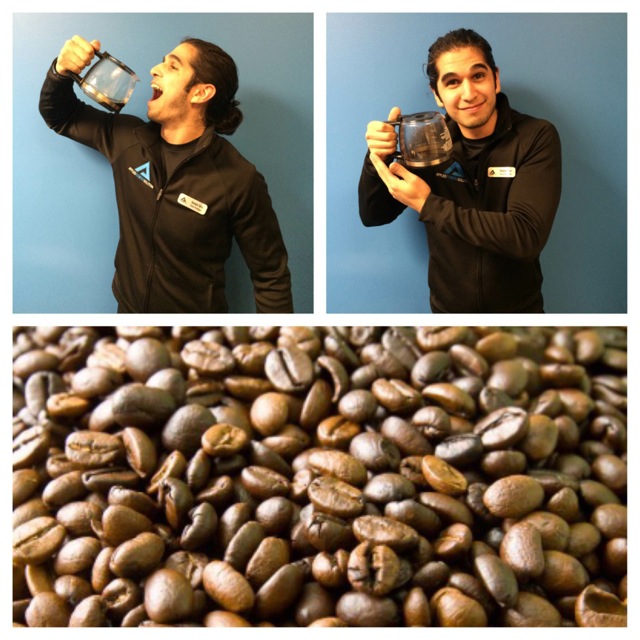 Caffeine is a central nervous system stimulant. Caffeine is found in plants (typically tea and coffee plants), cocoa beans and fruits. While many people use caffeine to stay awake and alert during the day, caffeine also may improve fat mobilization.
Caffeine is a central nervous system stimulant. Caffeine is found in plants (typically tea and coffee plants), cocoa beans and fruits. While many people use caffeine to stay awake and alert during the day, caffeine also may improve fat mobilization.
Benefits and Research
Caffeine acts in the mid-brain, causing an increased release of dopamine (the “feel-good” hormone) and increased blood sugar usage. Mood, cognitive function and performance can be improved in certain populations because of the increased release of dopamine and blood sugar use.
One study showed increases in performance in highly trained swimmers when compared to moderately trained swimmers after consuming 250 mg prior to exercise. Another study tested nine competitive cyclists. Two trials were performed — one with and one without 330mg caffeine 60 minutes prior to training. The study found that the cyclists who ingested caffeine felt their effort was less, despite cycling longer (90.2 minutes with caffeine vs. 75.5 minutes without). The caffeine group also broke down more fat (118g with caffeine vs 57g without).
How much is too much?
A safe amount of caffeine for healthy adults is up to 400mg per day. Once ingestion spikes to 500-600mg, the following side effects may occur
- insomnia
- restlessness
- irritability
- upset stomach
- tachycardia (increased heart rate)
- muscle tremors
People with high blood pressure, heart problems or who already are experiencing sleep issues should avoid supplemental caffeine intake (coffee, energy drinks, etc.) Whenever your doctor prescribes medication, double check that caffeine supplementation doesn’t interfere with the medication. – (courtesy of the Mayo Clinic)
How to incorporate Caffeine for Fat Loss
Since most of us are not competitive cyclists or endurance athletes, the improved performance aspects of caffeine aren’t as relevant. What we can take away is that caffeine does increase our fat breakdown rate when we exercise (who doesn’t want that!). If no medical issues are present and assuming you’re a healthy adult, 100-150mg of caffeine before exercise can provide some increased fat breakdown from your workout. Talk with your practitioner to see if caffeine is right for you.
About the Author:
-

Michael Stack is the founder & CEO of Applied Fitness Solutions and Frontline Fitness Pros. He is a faculty lecturer for the University of Michigan’s School of Kinesiology. He is also the creator and the host of the Wellness Paradox Podcast, produced in conjunction with University of Michigan.
Michael is an exercise physiologist by training and a health entrepreneur, health educator, and fitness industry advocate by trade. He is dedicated to enhancing the standard of practice of, and advocating for, fitness and wellness professionals to ensure they become an essential constituent in the healthcare delivery system.
With a career spanning over three decades in fitness, health, and wellness Michael has a deep knowledge of exercise physiology, health/wellness coaching, lifestyle interventions to mitigate chronic disease and leadership. He is credentialed through the American College of Sports Medicine (ACSM) as an Exercise Physiologist (ACSM-EP), Exercise is Medicine practitioner (ASCM-EIM), and a Physical Activity in Public Health Specialist (ACSM-PAPHS). Michael is a National Strength & Conditioning Association (NSCA) Certified Strength & Conditioning Specialist (CSCS), and a CDC Diabetes Prevention Program (DPP) Lifestyle Coach.
Michael received his undergraduate degree from the University of Michigan’s School of Kinesiology in 2004 and is currently a Master’s of Public Health (MPH) candidate at University of Michigan, with a specific concentration in health behavior and health education.
Michael is a board of directors’ member for the Physical Activity Alliance and Michigan Fitness Clubs Association. He sits on the University of Michigan’s School of Kinesiology Alumni Board of Governors. Michael is an expert curriculum reviewer for the American College of Lifestyle Medicine. Finally, he is a member of the executive leadership team for American Heart Association’s Heart Walk.
Michael lectures nationally for several health/fitness certification and continuing educations, including; IHRSA, the Medical Fitness Association, the National Strength & Conditioning Association, and SCW Fitness.
